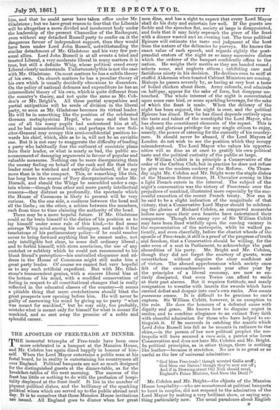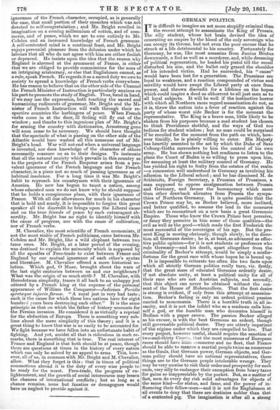THE APOSTLES OF FREE-TRADE AT DINNER.
THE immortal triumphs of Free-trade have been once _I. more celebrated in a banquet at the Mansion House, and Mr. Cobden has again dined happily in honour of him- self. When the Lord Mayor entertains a public man at his festal board, he in reality is entertaining his countrymen all over England. Political banquets are not so much designed for the distinguished guests at the dinner-table, as for the breakfast-tables of the next morning. The success of the feast has little or nothing to do with the profusion of hospi- tality displayed at the feast itself. It lies in the number of piquant political dishes, and the brilliancy of the sparkling political wines which are served up to the public abroad next day. It is to ourselves that these Mansion House invitations are issued. All England goes to dinner when her great men dine, and has a right to expect that every Lord Mayor shall do his duty and entertain her well. If the guests are feeble and the speeches flat, society at large is disappointed, and feels that it may fairly reproach the giver of the feast with a dinner wasted and an evening lost. The true political Epicure will estimate the taste and judgment of the host from the nature of the delicacies he purveys. He knows the exact value of each speech, and regards rightly the post- prandial orators of the night as so many successive dishes which the orderer of the banquet confidently offers to the nation. He weighs their merits as they are handed round ; selects some, and neglects others ; exhibiting care and fastidious nicety in his decision. He declines even to sniff at stuffed Alderman when toasted Cabinet Ministers are coming. Bishops he passes severely by, as having at very best a taste of boiled chicken about them. Army colonels' and admirals on half-pay, appear for the sake of form, but disappear un- touched. The whole interest of the night is concentrated upon some rare bird, or some sparkling beverage, for the sake of which the feast is made. 'When the delicacy of the night has been enjoyed, the night is over, and the political Epicure has dined. How he has dined depends entirely upon the taste and talent of the worshipful the Lord Mayor, who has chosen the constituent elements of the repast. This is a high and glorious privilege for any single citizen to enjoy, namely, the power of catering for the curiosity of his country- men. It should never be abused, if the Lord Mayors of London do not wish to see the position which they occupy misunderstood. The Lord Mayor who values his opportu, nities will so dine as at once to gratify his own political taste and the political curiosity of the public at large. Sir William Cubitt is in principle a Conservative of the order of the Carlton Club, but in practice he does not refuse to give us the modern cookery of the Reform. On Thurs- aay night Mr. Cobden and Mr. Bright were the staple dishes at the Mansion House dinner, M. Chevalier coming in like a light French entrée in the interval. The subject of the night's conversation was the victory of Free-trade over the prejudices of mankind, illustrated more especially by the suc- cessful execution of the recent French treaty. Nor can it be said to be a slight indication of the magnitude of that victory, that a Conservative Lord Mayor should be celebrat- ing the glories of Richard Cobden' as conquered monarchs before now upon their own hearths have entertained their conquerors. Though the canny eye of Sir William Cubitt may have been fixed wistfully upon the coming vacancy in the representation of the metropolis, while he walked pa- tiently, and even cheerfully, before the chariot wheels of the apostle of Free-trade, it still is a proof of the progress of truth and freedom, that a Conservative should be willing, for the sake even of a seat in Parliament, to acknowledge the past absurdities of his party. Mr. Bright and Mr. Cobden, though they did not forget the courtesy of guests, wore nevertheless without disguise the clear confident air of victors. The absurd apprehensions which society once felt of the encroachments made year after year by the principles of a liberal economy, are now so en- tirely dissipated, that even Tories can afford to smile at their past alarms. But it requires fortitude:, and manly resignation to wreathe with laurels the swords which have carried defeat and despair into one's own ranks. Non amnia pommua omnea. It is difficult to be gracious to one's captors. Sir William Cubitt, however, is an exception to the rule. He does the honours of a defeated cause with dignity and grace. He knows how to disguise regret in smiles, and to combine allegiance to an extinct Tory faith with cheerful admiration for those who have helped to ex- tinguish it. If he succeeds in catching the mantle which Lord John Russell lets fall as he mounts in radiance to the skies,—in the person of her new political prophet the me- tropolis will have secured a raira atria a patriot who loves Conservatism and does not hate Mr. Cobden and Mr. Bright. In political principles, as in other things, there is nothing like leather—because it stretches. No law is so great or so useful as the law of universal admiration: "God bless Free-trade! though worsted Gallia scoff; God bless our Duties! though they're now cut off And if in Downing-sret Old Nick should revel, England's Prime M. .ster, God bless the Devil !"
Mr. Cobden and Mr. Bright—the objects of the Mansion House hospitality—who are accustomed at political banquets' to hunt in couples' did not respond to the admiration of the Lord Mayor by malting a very brilliant show, or saying any- thing particularly new. The usual paradoxes about English ignorance of the French character, occupied, as is generally the case, that small portion of their speeches which was not devoted to self-congratulation ; and Mr. Bright revelled in imagination on a coming millennium of cotton, and of com- merce, and of peace, which we are to owe entirely to Mr. Cobden and an increased knowledge of French grammar. A self-contented mind is a continual feast, and Mr. Bright enjoys perennial pleasure from the delusion under which he labours that all who do not agree with him are either foolish or depraved. He insists upon the idea that the reason why England is alarmed at the armament of France, is either that we are obliged to provide commissions for the sons of an intriguing aristocracy, or else that Englishmen cannot, as a rule, speak French. He regards it as a sacred duty we owe to society to spread a knowledge of French verbs everywhere. He has reason to believe that on the other side of the Channel the French Minister of Instruction is particularly anxious on his part to promote the study of English. Thus, hand in hand, if we may use the expression, both teaching the sacred and humanizing rudiments of grammar, Mr. Bright and the Mi- nister of French Instruction will walk through their re- spective countries the harbingers of peace. When French verbs come in at the door, ill feeling will fly out of the window ; and thanks to this ingenious plan of Mr. Bright's for arming the country with dictionaries, Armstrong guns will soon cease to be necessary. We should have thought that the spectacle of what is passing on the other side of the Atlantic would have washed all this nonsense out of Mr. Bright's head. War will not end when a universal language is invented, nor does knowledge of the character of others necessarily reassure us as to their designs. To insinuate that all the natural anxiety which prevails in this country as to the projects of the French Emperor arises from a pre- valent ignorance of the French language and the French character, is a piece not so much of passing ignorance as of habitual insolence. For a long time it was Mr. Bright's habit to reproach his countrymen with their ignorance of America. He now has begun to taunt a nation, among whose educated men we do not know why he should suppose that he holds a conspicuous place, with their ignorance of France. With all due allowances for much in his character that is bold and manly, it is impossible to forgive this great speaker all the discredit he brings upon the Liberal cause and on the true friends of peace by such extravagant ab- surdity. Mr. Bright has no right to identify himself with the cause of progress, nor with the cause of cultivation, nor of French verbs.
M. Chevalier, the most scientific of French economists, if not the most stable of French politicians, came between Mr. Cobden and Mr. Bright, like a wild elephant between two tame ones. Mr. Bright, at a later period of the evening, was destined to explain the animosity which is supposed by all the apostles of Free-trade to exist between France and England by our mutual ignorance of each other's syntax and literature. M. Chevalier offered a more historical so- lution. Which god, 0 Muse, brought about the wars of the last eight centuries between us and our neighbours ? What was the origin of so much strife ? M. Chevalier, with Herodottean simplicity, traces it all back to an unhappy jest uttered by a French king at the expense of the personal appearance of William the Conqueror—Iudicium Paridi8 apretxque injuria forme. "A royal jest in very bad taste; such is the cause for which these two nations have for eight hundred years been destroying each other." It is the same principle as that on which the father of history accounts for the Persian invasion. He considered it as virtually a reprisal for the abduction of Europa. There is something very sub- lime about the mere simplicity of this theory; and it is a great thing to know that war is so easily to be accounted for. We fight because we have fallen into an unfortunate habit of fighting. And yet, amidst all that is ridiculous in such re- marks, there is something that is true. The real interest of France and England is that both should be at peace, though there are questions at times in the history of every nation which can only be solved by an appeal to arms. This, how- ever, all of us, in common with Mr. Bright and M. Chevalier, allow. What they forget is this; that in times of political commotions abroad it is the duty of every wise people to be ready for the worst. Free-trade, the progress of en- lightenment, and the growth of social intercourse may lessen the chances of international conflicts ; but so long as a chance remains, none but fanatics or demagogues would have us neglect to provide against it.































 Previous page
Previous page